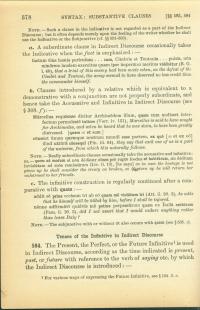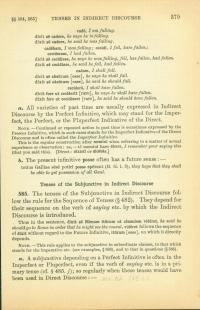584. The present, the perfect, or the future infinitive1 is used in indirect discourse, according as the time indicated is present, past, or future with reference to the verb of saying, etc., by which the indirect discourse is introduced.
Cadō.
I am falling.
Dīcit sē cadere.
He says he is falling.
Dīxit sē cadere.
He said he was falling.
Cadēbam.
I was falling.
Cecidī.
I fell.
(have fallen)
Cecideram.
I had fallen.
Dīcit sē cecidisse.
He says he was falling.
(fell, has fallen, had fallen)
Dīxit sē cecidisse.
He said he fell.
(had fallen)
Cadam.
I shall fall.
Dīcit sē cāsūrum [esse].
He says he shall fall.
Dīxit sē cāsūrum [esse].
He said he should fall.
Ceciderō.
I shall have fallen.
Dīcit fore ut ceciderit. [rare]
He says he shall have fallen.
Dīxit fore ut cecidisset. [rare]
He said he should have fallen.
a. All varieties of past time are usually expressed in indirect discourse by the perfect infinitive, which may stand for the imperfect, the perfect, or the pluperfect indicative of the direct.
Note— Continued or repeated action in past time is sometimes expressed by the present infinitive, which in such cases stands for the imperfect indicative of the direct discourse and is often called the Imperfect Infinitive.
This is the regular construction after meminī when referring to a matter of actual experience or observation.
Tē meminī haec dīcere.
I remember your saying this.
(that you said this)
[Direct: dīxistī or dīcēbās]
b. The present infinitive posse often has a future sense.
Totīus Galliae sēsē potīrī posse spērant. (B. G. 1.3)
They hope that they shall be able to get possession of all Gaul.


